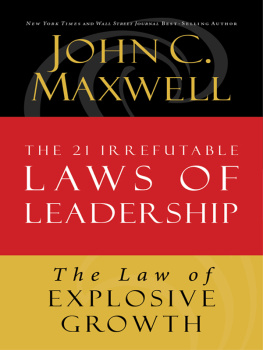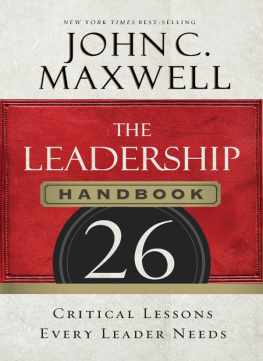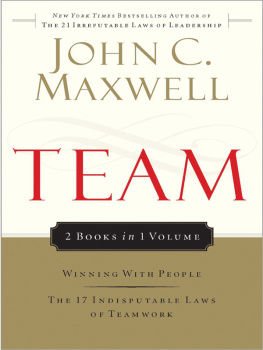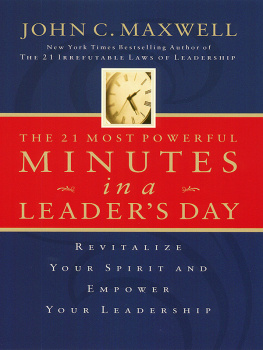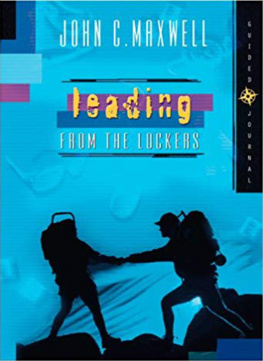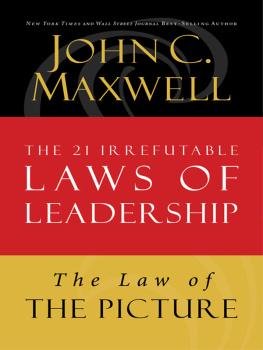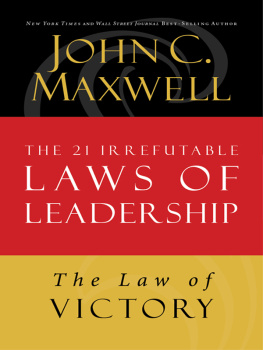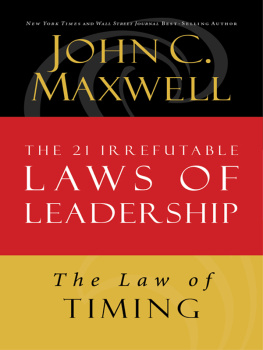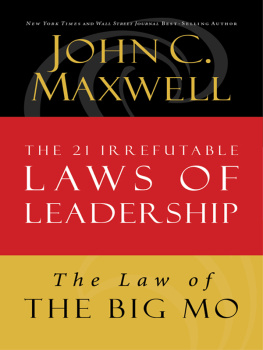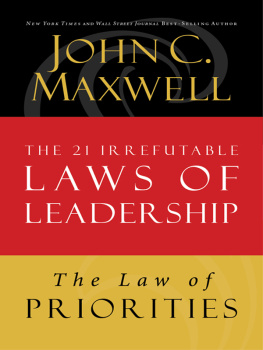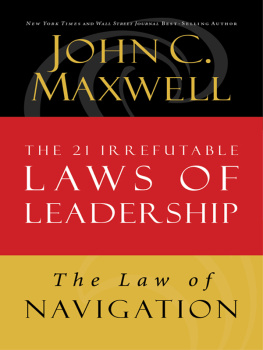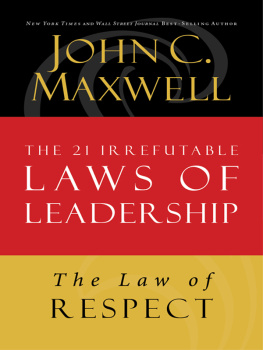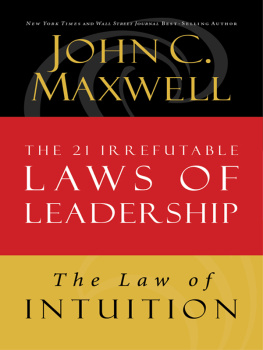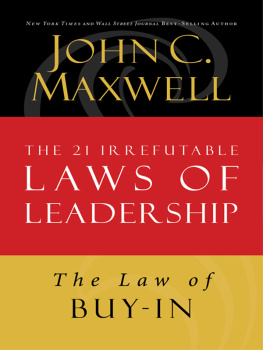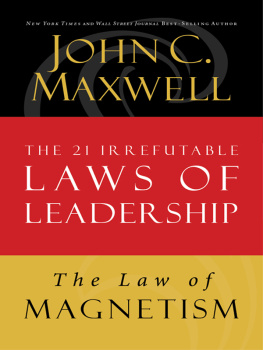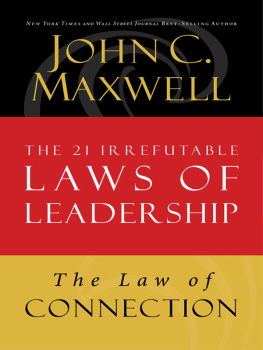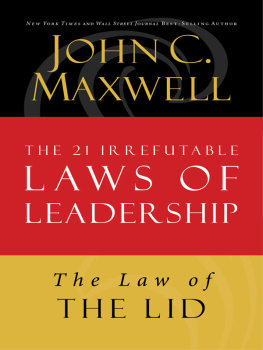
1998 and 2007 by John C. Maxwell
This ebook is derived from The 21 Irrefutable Laws of Leadership, by John Maxwell, 1998 and 2007 by Maxwell Motivation, Inc., a Georgia corporation.
All rights reserved. No portion of this book may be reproduced, stored in a retrieval system, or transmitted in any form or by any meanselectronic, mechanical, photocopy, recording, scanning, or otherexcept for brief quotations in critical reviews or articles, without the prior written permission of the publisher.
Published in Nashville, Tennessee, by Thomas Nelson. Thomas Nelson is a trademark of Thomas Nelson, Inc.
Thomas Nelson, Inc. titles may be purchased in bulk for educational, business, fund-raising, or sales promotional use. For information, please e-mail SpecialMarkets@ThomasNelson.com.
Published in association with Yates & Yates, LLP, Attorneys and Counselors, Orange, California.
Scripture quotations noted CEV are from THE CONTEMPORARY ENGLISH VERSION.
1991 by the American Bible Society. Used by permission.
Scripture quotations noted The Message are from The Message: The New Testament in Contemporary English. 1993 by Eugene H. Peterson.
ISBN 978-0-7852-7431-5 (HC)
ISBN 978-1-4185-3831-6 (ebook)
ISBN 978-1-4002-7579-3 (ebook of Chapter 20)

This book is dedicated to Charlie Wetzel, my writing partner since 1994. Together weve written more than forty books, and Ive enjoyed our collaboration on every one. As I have labored to add value to others by identifying and teaching leadership principles, Charlie, you have added value to me and my efforts. Your insights and skills as a wordsmith have been enjoyed by millions of readers. As a result, you have made a greater impact on more people than has anyone else in my inner circle. For that I thank you.
CONTENTS


Thank you to the thousands of leaders around the world who learned and sometimes challenged the laws of leadership, thus sharpening my thinking.
Thank you to the team at Thomas Nelson who gave me the chance to revise and improve this book, and especially to Tami Heim for her strategic leadership and to Victor Oliver who was instrumental in the development of the original concept.
Thank you to Linda Eggers, my executive assistant, and her assistant, Sue Caldwell, for their incredible service and willingness to go the extra mile every day.
Thank you to Charlie Wetzel, my writer, and Stephanie, his wife, with-out whose work this book would not have been possible.

To Add Growth, Lead Followers
To Multiply, Lead Leaders
I havent always felt the way I do now about leadership. My belief in the power of leadership and my passion for training leaders have developed over the course of my professional life. When I started in my career, I thought personal growth was the key to being able to make an impact.
My father had been very strategic in my development as I was growing up. He actually paid me to read books that he knew would help me and sent me to conferences when I was a teenager. Those experiences provided a great foundation for me. And after I began working, I discovered the Law of Process. That prompted me to take a proactive approach to my personal growth.
As a result, when people asked me to help them be more successful, I focused on teaching personal growth. It wasnt until I was forty years old that I began to understand the Law of the Inner Circle and the importance of developing a team. Thats when my ability to grow an organization and reach greater goals began to increase. But it wasnt until I began to focus on developing leaders that my leadership really took off. I had discovered the Law of Explosive Growth: to add growth, lead followersto multiply, lead leaders.
HELPING OTHERS TO LEAD
In 1990, I traveled to a country in South America with my wife, Margaret, to teach leadership in a national conference. One of the great joys of my life is teaching leadership to people of influence who desire to make a difference. I was really looking forward to this conference because it was an opportunity to add value to people outside my regular sphere of influence. But it didnt turn out the way I expected.
Everything started well. The people were very gracious, and I was able to connect with them despite the language and cultural barriers. But it wasnt long before I could tell that the attendees and I were not on the same page. When I started to teach about leadership, I could tell my comments were not connecting with them. They didnt engage, and what I was trying to communicate didnt seem to make an impact.
My read on the situation was confirmed after my first session with them. As I spoke with individuals, they didnt want to talk about leadership issues. They didnt ask questions about growing their organizations or fulfilling a vision. They sought advice about personal issues, problems, and conflicts with other people. I felt that I was back doing personal counseling similar to what I did at the beginning of my career. For the next three days, I grew more and more frustrated. The people I spoke to didnt understand leadership, and they had no desire to learn anything about it. For someone like me who believes that everything rises and falls on leadership, it drove me crazy!
This wasnt the first time I had experienced such frustration. I noticed that whenever I traveled to developing countries, I faced similar situations. I suspect that in nations where there is no strong business infrastructure and where government doesnt allow the citizens much freedom, it is difficult for leaders to develop.
On the flight home, I talked to Margaret about all my frustrations. I finally summed it up, saying, I dont want to do this anymore. I traveled thousands of miles just to counsel people on petty conflicts. If they would just turn their attention to becoming leaders, it would change their lives.
After listening patiently, Margaret replied, Maybe youre the one whos supposed to do something about this.
THE NEXT STEP
Margarets exhortation to do something about the leadership problems I had seen overseas stirred something within me. For the next several years, I reflected on the issue and thought about possible solutions. Finally in 1996, I decided what I would do. I brought together a group of leaders to help me create a nonprofit organization to develop leaders in government, education, and the religious community. I named it EQUIPencouraging qualities undeveloped in people.
For the next five years, EQUIP made modest progress in its goals. But in the months after the terrorist attacks of September 11, 2001, we went through a difficult period in which we had to lay off half the staff. But we took that as an opportunity to reexamine our priorities. We narrowed our focus and developed a new goalone so large and daunting it looked almost impossible. We would try to develop one million leaders around the globe by 2008. How could a small nonprofit organization hope to accomplish such a feat? By using the Law of Explosive Growth!
Next page
